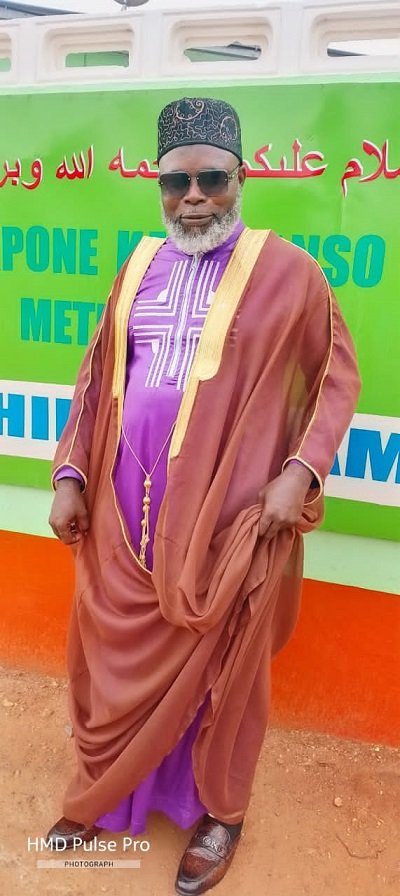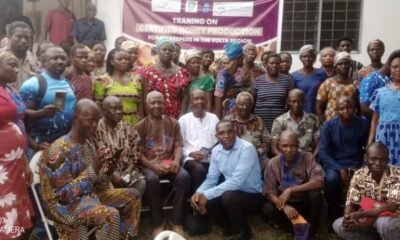Fruitful Living
Spiritual fullness in Christ
SPIRITUAL FULLNESS IN CHRIST
For it is by grace you have been saved, through faith—and this is not from yourselves, it is the gift of God— not by works, so that no one can boast. For we are God’s handiwork, created in Christ Jesus to do good works, which God prepared in advance for us to do. – Ephesians 2:8-10.
So then, just as you received Christ Jesus as Lord, continue to live your lives in him, rooted and built up in him, strengthened in the faith as you were taught, and overflowing with thankfulness. – Colossians 2:6-7.
INTRODUCTION
Paul wrote to the Colossians during his first imprisonment in Rome. The letter corrected misunderstandings by false teachers urging believers to blend other religious ideas with Christianity. The theme is the centrality of Christ. Though Paul did not know many of the believers personally, he was concerned for their spiritual welfare. He affirmed Christ’s deity as well as His Lordship over creation. Paul maintained that Jesus is the Creator and Sustainer of all things. He is more than able to reconcile us to God through His cross.
Next, Paul attacked a false teaching that had become a problem for Christians in Colossae. He challenged believers to continue their commitment and gratitude to Christ. Our lives should be grounded on the foundation of Jesus, and our faith should be fixed on Him as a result. When we see Jesus like this and lose sight of our own lives in His greatness, we understand who we truly are and for what we were created.
COLOSSIANS 1:1-29.
Paul, an apostle of Christ Jesus by the will of God, and Timothy our brother, To God’s holy people in Colossae, the faithful brothers and sistersin Christ:
Grace and peace to you from God our Father.
Thanksgiving and Prayer
We always thank God, the Father of our Lord Jesus Christ, when we pray for you, 4 because we have heard of your faith in Christ Jesus and of the love you have for all God’s people— the faith and love that spring from the hope stored up for you in heaven and about which you have already heard in the true message of the gospel that has come to you. In the same way, the gospel is bearing fruit and growing throughout the whole world—just as it has been doing among you since the day you heard it and truly understood God’s grace. You learned it from Epaphras, our dear fellow servant, who is a faithful minister of Christ on ourbehalf, and who also told us of your love in the Spirit.
For this reason, since the day we heard about you, we have not stopped praying for you. We continually ask God to fill you with the knowledge of His will through all the wisdom and understanding that the Spirit gives,so that you may live a life worthy of the Lord and please Him in every way: bearing fruit in every good work, growing in the knowledge of God, being strengthened with all power according to His glorious might so that you may have great endurance and patience, and giving joyful thanks to the Father, who has qualified youto share in the inheritance of His holy people in the kingdom of light. For He has rescued us from the dominion of darkness and brought us into the kingdom of the Son He loves, in whom we have redemption, the forgiveness of sins.
The Supremacy of the Son of God
The Son is the image of the invisible God, the firstborn over all creation. For in Him all things were created: things in heaven and on earth, visible and invisible, whether thrones or powers or rulers or authorities; all things have been created through Him and for Him. He is before all things, and in Him all things hold together. And He is the head of the body, the church; He is the beginning and the firstborn from among the dead, so that in everything He might have the supremacy. For God was pleased to have all his fullness dwell in Him, and through Him to reconcile to Himself all things, whether things on earth or things in heaven, by making peace through His blood, shed on the cross.
Once you were alienated from God and were enemies in your minds because of your evil behaviour. But now he has reconciled you by Christ’s physical body through death to present you holy in His sight, without blemish and free from accusation— if you continue in your faith, established and firm, and do not move from the hope held out in the gospel. This is the gospel that you heard and that has been proclaimed to every creature under heaven, and of which I, Paul, have become a servant.
Paul’s Labour for the Church
Now I rejoice in what I am suffering for you, and I fill up in my flesh what is still lacking in regard to Christ’s afflictions, for the sake of His body, which is the church. I have become its servant by the commission God gave me to present to you the word of God in its fullness— the mystery that has been kept hidden for ages and generations, but is now disclosed to the Lord’s people. To them God has chosen to make known among the Gentiles the glorious riches of this mystery, which is Christ in you, the hope of glory.
He is the one we proclaim, admonishing and teaching everyone with all wisdom, so that we may present everyone fully mature in Christ. To this end I strenuously contend with all the energy Christ so powerfully works in me.
COLOSSIANS 2:1-23
I want you to know how hard I am contending for you and for those at Laodicea, and for all who have not met me personally. My goal is that they may be encouraged in heart and united in love, so that they may have the full riches of complete understanding, in order that they may know the mystery of God, namely, Christ, in whom are hidden all the treasures of wisdom and knowledge. I tell you this so that no one may deceive you by fine-sounding arguments. For though I am absent from you in body, I am present with you in spirit and delight to see how disciplined you are and how firm your faith in Christ is.
Spiritual Fullness in Christ
So then, just as you received Christ Jesus as Lord, continue to live your lives in Him, rooted and built up in Him, strengthened in the faith as you were taught, and overflowing with thankfulness.
See to it that no one takes you captive through hollow and deceptive philosophy, which depends on human tradition and the elemental spiritual forces of this world rather than on Christ.
For in Christ all the fullness of the Deity lives in bodily form, and in Christ you have been brought to fullness. He is the head over every power and authority. In Him you were also circumcised with a circumcision not performed by human hands. Your whole self ruled by the flesh was put off when you were circumcised by Christ, having been buried with Him in baptism, in which you were also raised with Him through your faith in the working of God, who raised Him from the dead.
When you were dead in your sins and in the uncircumcision of your flesh, God made you alive with Christ. He forgave us all our sins, having cancelled the charge of our legal indebtedness, which stood against us and condemned us; he has taken it away, nailing it to the cross. And having disarmed the powers and authorities, he made a public spectacle of them, triumphing over them by the cross.
Freedom From Human Rules
Therefore do not let anyone judge you by what you eat or drink, or with regard to a religious festival, a New Moon celebration or a Sabbath day. These are a shadow of the things that were to come; the reality, however, is found in Christ. Do not let anyone who delights in false humility and the worship of angels disqualify you. Such a person also goes into great detail about what they have seen; they are puffed up with idle notions by their unspiritual mind. They have lost connection with the head, from whom the whole body, supported and held together by its ligaments and sinews, grows as God causes it to grow.
Since you died with Christ to the elemental spiritual forces of this world, why, as though you still belonged to the world, do you submit to its rules: “Do not handle! Do not taste! Do not touch!”? These rules, which have to do with things that are all destined to perish with use, are based on merely human commands and teachings. Such regulations indeed have an appearance of wisdom, with their self-imposed worship, their false humility and their harsh treatment of the body, but they lack any value in restraining sensual indulgence.
CONCLUSION
Jesus is superior in every realm of life. He is the perfect image of God. He has inheritance rights and supreme authority over all creation because He is God’s Son. What He created, He held together in a meaningful pattern, so all meaning in life and the universe has its source in Christ. That meaning is revealed to the world through the church of which Christ is the head. Jesus Christ is the perfect and complete revelation of God to humanity. Christ ‘is the image of the invisible God’ – Colossians 1:15. Paul boasted of Christ’s superiority in that the very essence of God ‘dwells bodily in Christ.’
Christ who created, maintains, and rules the cosmos came to earth to die for us so He could let us be at peace with God and make us morally holy in God’s sight.
The relationship with God, which had been broken by human rebellion and sinfulness, has now been restored by God for those who have been enduring faith in the gospel. God’s aim has always been to create a holy, pure people. Christ will present us to the Father as His people with no one to accuse us. Having this assurance in Christ, we must live the life of holiness.
Salvation for people comes as much from the power of God as it does from the love of God. God’ grace as we experience it, is the combination of His love and His power focused on our needs. The greatest display of God’s power was in His raising Christ from the dead. That same power raises us to new life in Christ. We must trust God to use His power to save us.
Stay blessed!
Please continue to join us on Asempa 94.7 FM – Sunday 5.30 am., Sunny 88.7 FM – Tuesdays 5:30 am; and YFM 107.9 – Sundays 6.30am; for our Radio Bible Study as well as Sunny FM 88.7 FM every Sunday at 3:30 pm. for Hymn and their Stories
By Dr. Joyce Aryee, the author
Fruitful Living
Eid-ul-Adha: A living legacy of faith, sacrifice, and devotion

We begin in the name of Allah, the Most Merciful, the Most Compassionate. We praise Him, seek His help and forgiveness, and seek refuge in Him from the evils of our souls and the wrongs of our actions.
May peace and blessings be upon the Prophet Muhammad (peace be upon him), his family, his noble companions, and all those who follow his path until the Day of Judgment.
Understanding the essence
of Eid-ul-Adha
Eid-ul-Adha, the Festival of Sacrifice, is one of the two major Islamic celebrations observed by Muslims across the world.
It commemorates the unwavering submission of Prophet Ibrahim (Abraham, peace be upon him) to Allah’s command when he was prepared to sacrifice his beloved son Isma’il (Ishmael, peace be upon him). Allah, in His infinite mercy, intervened and replaced the son with a ram, thus honouring Ibrahim’s sincerity and faith.
This moment of sacrifice is recorded in the Qur’an: “Then when they had both submitted and he put him down upon his forehead, We called out: ‘O Ibrahim! You have fulfilled the vision.’ Indeed, We thus reward the doers of good.” (Surah As-Saffat, 37:103–105)
This act of obedience is not merely a historical account. It is a living symbol that forms the essence of Eid-ul-Adha.
Ibrahim (A.S): The Architect
of Submission
Before the moment of sacrifice, Prophet Ibrahim and his family played critical roles in establishing Islam’s foundational pillars:
1. The building of the Ka‘bah
Prophet Ibrahim and his son Isma’il were chosen to construct the Ka‘bah, the sacred House of Allah in Makkah. The Qur’an records this noble moment:
“And [mention] when Ibrahim was raising the foundations of the House and [with him] Isma’il, [saying], ‘Our Lord, accept [this] from us. Indeed, You are the Hearing, the Knowing.’”
(Surah Al-Baqarah 2:127)
This structure remains the spiritual centre of Muslim worship, facing which over a billion Muslims direct their daily prayers.
2. The struggle of Hajar (Hajara) between Safa and Marwa
The mother of Isma’il, Hajar (Hajara), exemplifies a profound lesson of patience and faith. Left in the barren valley of Makkah with her infant, she ran between the hills of Safa and Marwa, desperately searching for water. Her perseverance was rewarded when the well of Zamzam sprang forth at the feet of her baby.
Her sincere struggle is now ritualised in Hajj as the Sa‘i between Safa and Marwa—a reminder of the role of women, the power of du‘a, and the value of trust in Allah’s provision.
Sacrifice at Mina and the
Rites of Jamarat
During Hajj, pilgrims reenact Ibrahim’s confrontation with Shaytan at Mina, where he rejected the devil’s temptation and cast stones at him. This act is now observed in Hajj as the ritual of stoning the Jamarat, symbolising the rejection of evil, temptation, and disobedience.
It is a vivid spiritual lesson: the path to Allah is one of resistance to distraction and sin, and one must be prepared to fight these forces with unwavering faith.
The essence of Arafat in Hajj
The Prophet Muhammad said:“Hajj is Arafah.” (Sunan al-Tirmidhi, 889)
Standing on the plain of Arafat, in deep humility and supplication, is the heart of Hajj. It represents the Day of Judgment, when all of humanity will stand before their Creator. The Prophet said: “There is no day on which Allah frees more people from the Fire than the Day of Arafah.” (Sahih Muslim, 1348)
For pilgrims, Arafat is a time of repentance, reflection, and renewal— and for non-pilgrims, fasting on that day is highly recommended.
Three core lessons from the
Sacrifice of Prophet Ibrahim
(A.S.)
1. Absolute obedience to Allah
Ibrahim’s willingness to sacrifice his son teaches that the essence of faith is unquestioning obedience to Allah. He prioritised divine command over emotion, logic, or comfort.
Takeaway:
In our lives, we must also be ready to put aside our desires, egos, and even attachments if they conflict with Allah’s instructions. This may involve sacrifices such as waking up for Fajr, staying away from haram income, or being truthful in difficult situations.
2. Sincere intention and inner sacrifice
The real essence of the sacrifice lies in the heart’s submission to Allah.
It is neither their meat nor their blood that reaches Allah, but it is your piety that reaches Him.”
(Surah Al-Hajj 22:37)
Takeaway:
Every act of worship should be grounded in sincerity. Whether it is prayer, charity, or sacrifice, what matters most is the purity of our intention.
3. Sacrifice for the greater good
The legacy of Eid-ul-Adha teaches us that sometimes, faith requires us to give up what we love for a greater purpose. Sacrificing wealth, time, or status in the path of Allah or for the benefit of others leads to spiritual elevation.
Takeaway:
Use your resources such as time, money, skills, for acts of benefit: support the poor, educate the young, assist the sick, and build your community.
Celebrating Eid-ul-Adha: A
Festival for all Muslims
Even for those who do not go on Hajj, Eid-ul-Adha holds immense significance. Muslims across the world participate in the act of Qurbani (sacrifice) to honor the tradition of Ibrahim (A.S.).
Types of animals and their
symbolism
Permissible animals include goats, sheep, cows, and camels. Each must meet a minimum age and be free of defects. The sacrificed animal is then divided into three parts: one for the family, one for relatives and friends, and one for the poor and needy.
This distribution reflects the spirit of sharing, compassion, and social responsibility—values at the heart of Islam.
The eternal message of Eid-ul-Adha
Eid-ul-Adha is not merely a celebration; it is a living tradition that calls us to:
• Submit like Ibrahim,
• Strive like Hajar,
• Sacrifice like Isma’il,
• Reflect like the pilgrims at Arafat.
May this Eid awaken within us a renewed commitment to obedience, sincerity, and compassion.
Let us make every Eid-ul-Adha a step forward in our spiritual journey, embodying the values of submission, sacrifice, and service to humanity. I wish every Muslim Eid Mubaarak
By Imaam Alhaji Saeed Abdulai
(Kpone Katamanso Metropolitan Chief Imaam)
Fruitful Living
Steps taken by government to combat illicit drugs (Final part)
The Minister for the Interior, Muntaka Mohammed-Mubarak, has reaffirmed the government’s commitment to combating drug abuse and illicit trafficking for a safer environment which would
go a long way to make Ghana a drug-free country. 3News.com (2025)
Solutions to Illicit Drugs from the Islamic perspective
are comprehensive and emphasise of both prevention and treatment:
Tarbiyah (Islamic nurturing): Instilling strong Islamic values from childhood through Qur’anic education, regular prayer, and association with righteous companions.
Community preaching (Da’wah): Imams must consistently raise awareness during khutbahs and Islamic programs about the dangers of drugs and the beauty of a sober, productive life.
Faith-based rehabilitation: Mosques and Islamic centers can partner with medical institutions to offer Qur’an therapy, spiritual counseling, and structured recovery programs.
Islamic youth clubs: Providing youth with halal entertainment, mentorship, and purposeful engagement can steer them away from harmful peer groups.
Zakat and Sadaqah: Channelling funds to support families of victims and establishing centres for rehabilitation.
Role of Parents, Society, Muslim Chiefs and Imams:
Parents must be vigilant and provide emotional support. A loving, nurturing home reduces a child’s vulnerability to drugs.
Society should de-stigmatize addiction. Drug users should be seen as patients needing healing, not criminals deserving rejection.
Muslim Chiefs must lead community campaigns, setting moral examples and supporting policy enforcement.
Imams must be more than religious leaders—they must become counsellors, educators, and advocates. Their leadership can shift public perception and guide collective action.
Conclusion
Illicit drugs pose one of the most dangerous threats to our society, undermining our religious values, harming our youth, and destroying our future. The Islamic position is clear and
Unequivocal: such substances are forbidden due to their destructive consequences on all aspects of life. Islam does not merely condemn the act but calls for a holistic response—spiritual, social, and structural.
As a society, particularly as Muslims, we must rise to confront this crisis with faith, compassion, and commitment. We must not only preach against drugs but actively work to rehabilitate victims, educate the next generation, and partner with public institutions to create a society of wellness and righteousness.
Recommendations
1. Introduce Islamic drug awareness education in madrasas and public schools, using Quran and Hadith-based materials to instill moral responsibility.
2. Create partnerships between the Ghana Narcotics Control Commission, Ghana Health Service, and Muslim organisations to develop culturally sensitive rehabilitation centres.
3. Train Imams and teachers in basic mental health and drug abuse counselling to serve as front-line responders in communities.
4. Utilise Friday sermons (khutbahs) nationwide to address the dangers of drug abuse periodically and provide practical steps for prevention.
5. Encourage community surveillance, where parents, chiefs, and youth groups report dealers and suspicious activities to the authorities.
6. Establish mentorship programmes in every Muslim community where successful, drug-free role models mentor youth.
7. Form interfaith coalitions, working across religious lines to tackle the drug menace as a national threat rather than a religious issue.
8. Provide job skills training for rehabilitated victims, helping them reintegrate into society and live dignified, self-sufficient lives.
By Imam Alhaji Saeed Abdulai, the Author







